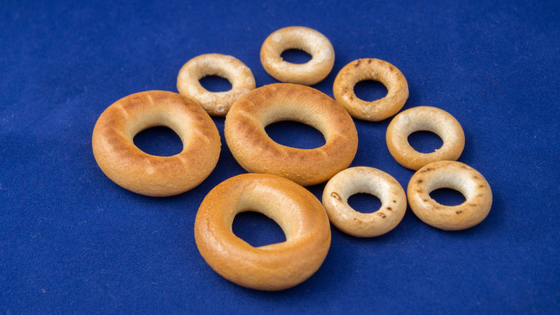Yes, you do know what Yiddish is.
In fact, you probably already know several words in this idiom, although you may not realize where they come from. I began thinking about some of them when we found ourselves in a lively discussion over the whole thing recently.
It all started as we were driving down the road. I had just opened a package (we had stopped and checked our mail), and I began to leaf through the book I’d received and look at the pictures. I tried to explain to my husband, who was driving, that some sorts of styles of decorating are just too schmaltzy.
“I have no idea what that means,” he asserted. “You know,” I explained, “they are too much—too frilly, too froufy, too cutesy—just too schmaltzy.” He said he’d never heard that word before. “Oh,” I tried to clarify, “it’s a Yiddish word. It literally means, ‘there’s too much chicken fat in this soup, or whatever dish you’re cooking,’ but that’s not how it’s used most of the time. It means, usually, that something is too sentimental or melodramatic, or that it’s too ornate, or overdone– it’s just—you know, just kitsch.”
“What?!!!” he exclaimed. “I’ve never heard that word either! And I have no idea what Yiddish is!!”

“Ummmm….well, it’s is a sort of dialect of Jewish words that is used in New York, I think,” I said, calling upon my best vague impressions, “and kitsch means lots of little knick-knacks from the dime store that sit around and collect dust; they are just trash, not really worth anything. You know, gaudy and cheap.”
“Oh,” he said, “like little plastic figurines with gold paint on them that rubs off?”
“Yes, exactly,” I agreed. I tried to think of some other good examples of Yiddish words, but wasn’t sure whether they were properly to be attributed to German or Jewish immigrants….or both….”kaputt?”…”bagel?”….”Ummmm, let me google it,” I stalled, reaching for my phone, and moralizing; “I think that the reason Yiddish words are so useful is that they are so expressive of the emotion which they convey. The very sound of the word, and forming it in your mouth so vehemently, demonstrates the strong feeling that you want to express.” My husband looked doubtful.
However, the last time I made matzoh-dumpling soup, he thought it was one of the most delicious concoctions he’d ever tasted (evidently, mine wasn’t too schmaltzy!), so I considered that I might unearth further culinary inspiration on our little word search. Don’t you think a bagel, warm, with butter or cream cheese…..

Ahem. Anyway, I found a wealth of fascinating Yiddish words, and we laughed as my husband tried to work up extra spit to pronounce them; their meanings we found equally amusing. Until he called me a “baleboste,” (a bossy woman!!–although another meaning of that word is ‘an excellent homemaker,’ or ‘super-woman,’ so perhaps I shouldn’t object too much–) and then some contorted combination of “babushka” and “baleboste.” (“I’m NOT your grandmother!” I countered, “and anyway, I think that’s more of a Russian Jewish word….” although frankly, these Yiddish expressions seem to be liable to extensive varieties of spelling and alterations. Probably because most of us don’t read the Hebrew alphabet, in which these words rightly ought to be written!!)

You probably know the word, “klutz,” and that it means, “a clumsy person,” and you most likely have heard someone use the phrase “noshing,” to refer to snacking or nibbling at food. And of course you know, a “glitch” is a small aberration or annoying mistake (although literally it seems to mean ‘slip,’ ‘skate,’ or ‘nosedive.’) And, certainly you know that thoroughly Yiddish word, ‘kosher,’ without my explanations.
One that my husband knows, and uses! is “Oy! vey!!” which I gather means something like, “Oh, how AW-ful!” but he assures me that it doesn’t work properly if one doesn’t use the approved degree of distress in pronunciation. (I shall have to ask him for more particulars on how this is done, as I studied German in college, and might be somewhat prejudiced thereby to an inferior expression of the thing.)
In fact, some of these words appear to be directly borrowed from German, such as “fershtay” (German, ‘verstehen,’ to understand), “mach schnell!” (German, ‘hurry up!’), and one that you have doubtless heard before, “spiel.” For example, ‘He gave me some spiel about the last owner having taken care of this car as though it were his baby,’ in other words, a speech or story, implied to be fabricated for the purpose of impressing, deceiving, or placating the listener. (‘Spiel,’ in German, literally means, ‘to play,’ as an instrument, but it also connotes the theater kind of play, from which we probably derive our American slang meaning.)
You’ve probably heard “Mazel tov!” in a movie, or seen it on a greeting card; it means, of course, ‘congratulations!’ (implied, ‘on your graduation or other recent joyous event.’) And one that I particularly like: “May you live to be 120!” which is the ultimate Jewish wish for good health, since Moses lived to be 120. (If you want to know how to actually say this phrase in Yiddish, see the last reference link, which I have listed below.)
I was gratified to see that I have frequently used another of these excellent terms; I have often said of our dog, that he “schlepped his food (or an empty pizza box, or whatever’s readily accessible) all over the carpet,” which he is indeed fond of doing, especially with something so delicious and viscous as—an ice cream cone! I gave him one. Once. And that is an experiment which I shan’t repeat. (You can imagine my vigorous efforts which were required to undo his schlepping….)
One of my absolute favorites should be familiar to most Christians: “Shalom,” which carries the rich meaning of ‘God’s peace, whole and complete, with nothing broken and nothing missing.’ I think we can’t tell our friends and family enough, ‘Shalom to you.’
If you wish to explore the delights of expressing yourself in this authentic Jewish dialect further, here are some links to a few articles that may amuse you. (I should warn you, however, that if you merely do a carte blanche search of the subject on the internet, you may learn some words you ought not to repeat!! )
https://www.dailywritingtips.com/the-yiddish-handbook-40-words-you-should-know/
(This is a short, amusing article, and a good introduction to common phrases. It kept me in stitches, and I assure you that it will make you laugh.)
(The above site is one of the most comprehensive lists, and seems to be one of the best of its kind available. It can be overwhelming to the uninitiated, but as a reference for someone truly wanting to write a paper on the topic, or to learn the language, it would be invaluable. Or, just to check and see if you are right….!!)
http://www.hebrew4christians.com/Glossary/
(This is perhaps my favorite, as it most clearly explains the pronunciation and meaning of each expression, gives an interesting little history of each item, and is well designed and visually appealing. It’s also professional and respectful and reverent, yet it’s quite easy to understand and to use. I found it very refreshing. Moreover, it occasionally displays a few of the words spelled out in their proper Hebrew form and alphabet, which will delight the researcher with a scholarly turn of mind, and gives the reader a sacred feeling.)
I hope that this little story sparked some recognitions in your own vocabulary, and that you can be on the lookout for more excellent words to express your own emotions with characteristic Jewishness. May your challah always be warm and homemade, and bring “a Gezund dir in Pupik” (a health to your belly button!!), or more properly perhaps, “a Gezund an dein Kopf!” (a health on your head!). In other words, a Jewish blessing to you!

